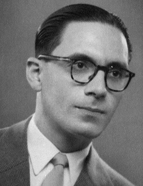

He studied in Coimbra, where his father , Dr Ferrand Pimentel de Almeida , was a full professor at the School of Arts and Humanities of the University of Coimbra . He graduated in Law (1946) and in Historical-Philosophical Sciences, a degree he completed in 1949, defending his dissertation in 1957 .
From an early age , he focused on studying the 17 th and 18 th centuries. And as early as 1955, to the south of Brazil: in his first writings on the subject, he analysed the testimonies of Vespucci’s possible passage down the River Plate and Francisco Ribeir o ’s information on the Colony of Sacramento (c. 1704). This would become the centrepiece of his research, although not exclusively. The book América la bien llamada (1947-1948), by the Argentinian Roberto Levillier, was combed through in order to dismantle the denial of Portuguese precedence in the discovery of the southern coast of Brazil, as the author had intended. In 45 pages of tightly wound arguments, with finesse and elegance, the author is shown to be at odds with all Portuguese authors, trying to prove that Vespucci was responsible for the discovery of the Brazilian coast in the expedition of 1501-1502, up to 52 or 53º South, well off the coast of Patagonia! When he probably had not travelled any further than 26º. And did not even reach the River Plate… LFA had no desire (or would not have felt inclined) to be a polemicist. He criticised serenely but always delicately, avoiding harsh words or expressions. The other seminal article from 1955, spanning 63 pages, tries to give an overview of the foundation and early years (until 1704) of the Colony of Sacramento on the River Plate. This would be the main topic to which LFA’s meticulous research would be devoted for nearly 50 years. He returned to this subject time and again, always perfecting his knowledge of the land, its occupation, and the surrounding adversities. These only ended with the Portuguese withdrawal in 1777 .
This work is financed by national funds through FCT - Foundation for Science and Technology, I.P, in the scope of the projects UIDB/04311/2020 and UIDP/04311/2020.
